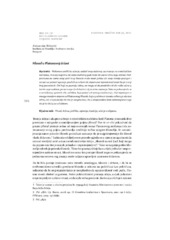Filosof u Platonovoj državi
The Philosopher in Plato’s State
Apstrakt
Plato’s political theory rests on metaphysical principles that are understandable to only a few. It is assumed that only a narrow group of philosophers is able to put this theory into practice, and using repressive measures. The fewer the initiated the greater the repression. It is assumed that those who do not know the truth can neither predict their destiny nor do anything to make it better because they are unable to understand the goal and purpose of the repression. It is demonstrated that, in the imagined use of force, the sophists, who do acknowledge it, resort to repression to a much lesser extent than Plato’s philosopher. At first, Plato’s philosopher rejects the use of force as virtue, but it turns out to be indispensible, and in incomparably more aspects than it was in the sophists’ case.
Ključne reči:
philosopher / tradition / repression / politics / stateIzvor:
Filozofija i društvo/Philosophy and Society, 2012, 388-406Finansiranje / projekti:
- Politike društvenog pamćenja i nacionalnog identiteta: regionalni i evropski kontekst (RS-MESTD-Basic Research (BR or ON)-179049)
Institucija/grupa
IFDTTY - JOUR AU - Nikitović, Aleksandar PY - 2012 UR - http://rifdt.instifdt.bg.ac.rs/123456789/591 AB - Plato’s political theory rests on metaphysical principles that are understandable to only a few. It is assumed that only a narrow group of philosophers is able to put this theory into practice, and using repressive measures. The fewer the initiated the greater the repression. It is assumed that those who do not know the truth can neither predict their destiny nor do anything to make it better because they are unable to understand the goal and purpose of the repression. It is demonstrated that, in the imagined use of force, the sophists, who do acknowledge it, resort to repression to a much lesser extent than Plato’s philosopher. At first, Plato’s philosopher rejects the use of force as virtue, but it turns out to be indispensible, and in incomparably more aspects than it was in the sophists’ case. T2 - Filozofija i društvo/Philosophy and Society T1 - Filosof u Platonovoj državi T1 - The Philosopher in Plato’s State SP - 388 EP - 406 DO - 10.2298/FID1203388N ER -
@article{
editor = "Milidrag, Predrag",
author = "Nikitović, Aleksandar",
year = "2012",
abstract = "Plato’s political theory rests on metaphysical principles that are understandable to only a few. It is assumed that only a narrow group of philosophers is able to put this theory into practice, and using repressive measures. The fewer the initiated the greater the repression. It is assumed that those who do not know the truth can neither predict their destiny nor do anything to make it better because they are unable to understand the goal and purpose of the repression. It is demonstrated that, in the imagined use of force, the sophists, who do acknowledge it, resort to repression to a much lesser extent than Plato’s philosopher. At first, Plato’s philosopher rejects the use of force as virtue, but it turns out to be indispensible, and in incomparably more aspects than it was in the sophists’ case.",
journal = "Filozofija i društvo/Philosophy and Society",
title = "Filosof u Platonovoj državi, The Philosopher in Plato’s State",
pages = "388-406",
doi = "10.2298/FID1203388N"
}
Milidrag, P.,& Nikitović, A.. (2012). Filosof u Platonovoj državi. in Filozofija i društvo/Philosophy and Society, 388-406. https://doi.org/10.2298/FID1203388N
Milidrag P, Nikitović A. Filosof u Platonovoj državi. in Filozofija i društvo/Philosophy and Society. 2012;:388-406. doi:10.2298/FID1203388N .
Milidrag, Predrag, Nikitović, Aleksandar, "Filosof u Platonovoj državi" in Filozofija i društvo/Philosophy and Society (2012):388-406, https://doi.org/10.2298/FID1203388N . .



